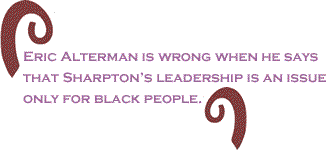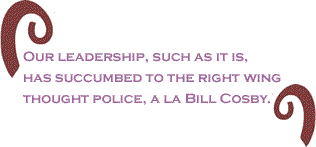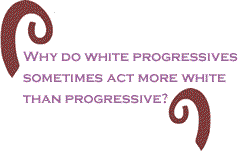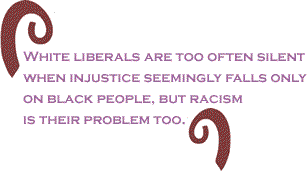
|
|||||||||||||||||||||
 |
These are very difficult times for progressives in America. There is one-party, right wing rule in Washington, a media that serves only corporate interests, and an opposition party that doesn’t do a very good job of opposing. These are difficult times for black people too. Our leadership, such as it is, has succumbed to the right wing thought police, a la Bill Cosby. They have joined in the beat down of the most powerless and soft-pedaled the misdeeds of the powerful. The current climate should bring all progressives together, but apparently even some on the left need to be reminded who and what we should fight. Consider the case of Eric Alterman and his recent comments on Al Sharpton. Alterman is a longtime writer for The Nation magazine, and the author of books such as What Liberal Media: the Truth About Bias and the News, and most recently co-author of The Book on Bush: How George W. (Mis) Leads America. He is a solid Democrat and an excellent writer.
On the other hand, Al Sharpton has been a problem child in the past year. Black Commentator took him to task when an acute bout of Jesse Jacksonophobia caused him to dismiss black leadership as a mere “club” and initially oppose filibustering the nomination of the reactionary Janice Rogers Brown to the federal bench. Just when it seemed that Sharpton couldn’t fall any further he employed the services of one Roger Stone, a Republican dirty trickster who aided and abetted the Florida vote theft in 2000. Unfortunately, Alterman’s reasons for criticizing Sharpton carry a lot less weight than Black Commentator’s. In an August 2, 2004 post on his Altercation weblog Alterman came close to calling Sharpton a Nazi:
A writer of Alterman’s caliber ought to know that if he doesn’t think Sharpton is a Nazi, he shouldn’t have made the analogy. As for the assertion that Sharpton has worsened race relations or damaged the cause of equality, Alterman’s willful ignorance is stunning. If Al Sharpton created white supremacy or unfettered capitalism he could be blamed for the sorry state of race relations. Of course Sharpton is responsible for neither of these pathologies, so Alterman’s statement is ridiculous.
How does one explain the sloppy thinking of a writer of Alterman’s caliber? Alterman was never fooled by the propaganda supporting the occupation of Iraq. He has been a mainstay of the progressive voice in American politics. Why would he make the statement that the still grossly unequal treatment of black America was caused by any black person?
It seems that for all his eruditeness on many other subjects, Alterman wasn’t sufficiently displeased with the racist status quo in American politics. Sharpton emerged as a leader in New York because he went where others, white liberals especially, would not. He spoke uncomfortable truths to the powerful when black New Yorkers had no political voice. Black New Yorkers had politicians, but they were too often ineffective or uninterested in making demands when it took courage to do so. Because of the limits inherent in elected office, having a Senator Obama will not lessen the need to have outspoken activists at the ready.
If Eric Alterman and other white liberals were willing to fill the political void that Sharpton filled, they would have no cause for complaint. Black Commentator said it best:
If history is any guide, it is inevitable that more black people in New York and elsewhere will be killed by police brutality. When that happens I expect to hear from Eric Alterman. Alterman is wrong when he says that Sharpton’s leadership is an issue only for black people. It is an issue for him as well. White liberals are too often silent when injustice seemingly falls only on black people, but racism is their problem too. George W. Bush is President in large part because of racism. Iraq has been occupied because of racism. The belief that black people have no right to live makes it easy to believe that Iraqis have no right to live. Eventually no one has any rights and we have a Patriot Act and FBI harassment of anti-war protesters. White liberals have to speak up now or forever hold their peace, even when issues seem to involve only black people. Of course, Alterman’s indecision in knowing how to deal with Sharpton is somewhat understandable. It must have been mystifying to white liberals when the crackpot, so-called educator Bill Cosby said that having the name Mohammed was an automatic ticket to the gray bar hotel, and Jesse Jackson and Kweisi Mfume defended his asinine remarks. So if he needs permission, I hereby give Eric Alterman the right to criticize Al Sharpton or anyone else who is black. I only ask that his criticisms make sense and that he join the black community when the lifting gets heavy. Margaret Kimberley’s Freedom Rider column appears weekly in |
| September 2 2004 Issue 103 |
|||||||||
|
|||||||||
|
|
|||||||||
| Printer Friendly Version | |||||||||
 |
|||||||||
 |
|||||||||
 |
|||||||||
| |
|||||||||
| |
|||||||||




























